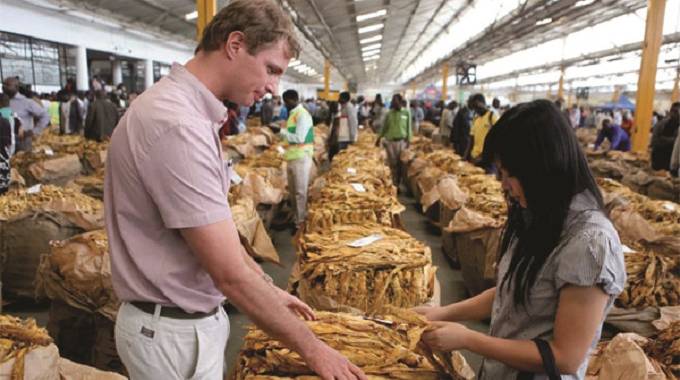Tobacco marketing season delayed

Buyers at a tobacco auction floor in this file picture
The Chronicle

Harare Bureau
Zimbabwe’s tobacco marketing season will be delayed this year due to late planting resulting from late rains, according to the Tobacco Industry and Marketing Board chief executive Dr Andrew Matibiri.
Tobacco is the country’s largest foreign currency earner.
The country’s foreign currency situation normally improves during the tobacco marketing season.
With Zimbabwe experiencing crippling foreign currency shortages, which has seen the country struggling to import adequate essential commodities such as fuel and medical drugs, inflows from the crop will improve the situation.
The dry spell, which most parts of the country experienced since the beginning of rainy season, saw many farmers planting several weeks after normal time, Dr Matibiri said.
The normal tobacco planting time is between September 1 and December 31.
However, the crop situation was “fair” with good yields expected if the rains persist.
“We had massive delays in planting due to late rains and this will obviously affect the start of the selling season,” Dr Matibiri said.
Last year, the season began mid-February.
Mr Wonder Chabikwa, the president of Federation of Farmers’ Union, said the crop situation had improved since the country started receiving the rains early January.
“We had half a month delay but today it is a good story,” Mr Chabikwa said in an interview.
He said farmers with early crop were already reaping and curing. “If the situation remains as it is, we expect to have a very good season,” he said.
Meanwhile, Dr Matibiri said the $70 million tobacco scheme for small-scale farmers was negatively affected by lack of foreign currency to procure essential inputs.
The Government was targeting to support 51 000 small-scale farmers but only 11 000 benefited, mostly fertilisers.
“The programme was delayed because of price increases. We were targeting to distribute inputs to 51 000 farmers but we only managed 11 000.
“But to farmers who have managed to source their fertilisers, we can provide chemicals,” he said.
Now dominated by small-scale growers who benefited under the land reform programme since 2000, the sector produced 252 million kilogrammes of the golden leaf in the last season, the highest ever output in the history of Zimbabwe.
Projections for this season are expected next week. This year, the Government said tobacco farmers will be paid 20 percent of their produce in forex to cushion them from the distortions resulting from multi-tier exchange system.
While the authorities have maintained that the quasi bond note currency and the Real Time Gross Settlement balances will remain rated at 1:1 with the United States dollar, critics have argued that the multi-tier exchange system is a reflection that the greenback is not at par with the RTGS balances and the bond note.
Tobacco farmers had warned failure by the Government to partly pay them in foreign currency would hurt production of Zimbabwe’s single largest foreign currency earner. Cotton farmers will also be paid 20 percent of the proceeds in hard currency.
